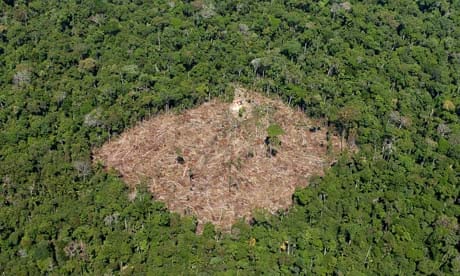The US president, Barack Obama, made his first public intervention in the Copenhagen climate summit today by backing a plan put forward by Norway and Brazil which would protect the world's rainforests with funding from rich countries that cannot meet their commitments to cut emissions domestically.
Speaking after he accepted the Nobel peace prize in Oslo, Norway, Obama said: "I am very impressed with the model that has been built between Norway and Brazil that allows for effective monitoring and ensures that we are making progress in avoiding deforestation of the Amazon.
"It's probably the most cost-effective way for us to address the issue of climate change - having an effective set of mechanisms in place to avoid further deforestation and hopefully to plant new trees."
The president is not due at the conference for another week but his intervention comes at a critical time in the summit where negotiations on deforestation are moving rapidly.
The scheme is seen as attractive because pilot studies have shown it to be effective and has the backing of Prince Charles's Rainforest Project.
Countries are more or less unanimously behind finding a way to reduce deforestation, which accounts for 16% of world greenhouse gas emissions, but are encountering sticking points which require the intervention of heads of state.
At least 20 different plans for Reduced deforestation and degradation (Redd) plans have been put forward by many different countries, but talks are in the balance over the rights and safeguards for people who live in or depend on the forests; how the money can be prevented from falling prey to corruption; how to measure and verify claims of protection and the future of existing forest industries.
Rich countries are eager to find a solution because a successful deal will provide them with a solution to "offset" hundreds of millions of tonnes of carbon. Poor countries, especially in the tropics, are equally keen because they stand to receive vast cash flow for protecting their forests.
Brazil is critical in forest talks because it not only is responsible for nearly 20% of all global forest emissions, but it has the largest swath of trees in the world and therefore stands to make more money than anyone else by protecting them.
Today, the talks were moving quickly. The EU has proposed a 50% cut in the rate of deforestation by 2020 and a complete halt by 2030. But Brazil said it did not want a specific target or timetable, arguing that Redd would be voluntary, and that developing countries needed to see how much money they might receive before committing themselves to such an ambitious global scheme.
Obama's endorsement of the Brazil-Norway plan was welcomed by non-governmental organisations who said that it indicated that money had a good chance of being found to set up Redd schemes.
A global deforestation initiative would take many years to establish, and would cost hundreds of millions of dollars to set up because it would require satellite technology and pilot projects. In addition, governments will have to pass domestic legislation before it begins.
Also in Copenhagen, Google demonstrated a new technology prototype that enables online, global-scale observation and measurement of changes in the Earth's forests. The technology, which combines satellite photography, area-measuring software and a "cloud" processing engine, will be offered as not-for-profit service to all nations.
